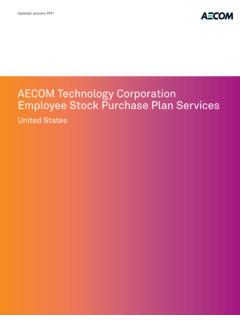Transcription of RealSteps> Real life. Real goals. - U.S. Bank
1 The use of stock options and other stock-related compensation (such as employee stock purchase plans or restricted stock) as a way to incentivize and reward key employees is increasingly common in today s workplace. It is a form of compensation that can be beneficial for the employee , but it also adds a degree of complexity to wealth planning. Here are answers to questions you may have about stock compensation received through your employer:What is a stock option?A stock option is an instrument that gives employees the right but not the obligation to purchase company stock at a predetermined price for a set period of time. Exercising an option means that you plan to execute a purchase of stock under the terms granted in the option. The price granted to an individual for the right to purchase shares of a company is referred to as the strike price, option price or grant price.
2 An option becomes most beneficial when the strike price is at a discount to the current market value of the stock. When an individual is granted a stock option, there may be a vesting period before the option can be are two types of stock options, separated primarily by their tax treatment: Non-qualified stock options Incentive stock options What are the features of non-qualified stock options (NQSOs)?These are among the most common form of stock option and receive no special tax treatment. NQSOs offer greater flexibility to the recipient and can be granted to employees or non-employees. The recipient of NQSOs has the freedom to exercise the option and to sell the stock at anytime. NQSOs are also in rare cases where the option has a readily ascertainable fair market value, NQSOs are not taxable on the date they are granted.
3 However, when the option is exercised, ordinary income tax is applied to the spread between the exercise price and the market price. At that continued on page 2 Explore all of our RealSteps> topics for quick, clear overviews on a wide range of subjects that can affect financial and Insurance products and services are: Not a Deposit Not FDIC Insured Not Guaranteed by the Bank May Lose Value Not Insured by Any Federal Government AgencyPlease see disclosures on page Compensation PlansRealSteps> real life . real compensation can represent a significant component of your income. It s important to under-stand your choices to obtain the greatest BANCORP INVESTMENTS | BANK time, the option holder owns the stock. The cost basis is the stock s market value on the exercise NQSOs are held for a period of time after exercising the option and then sold, any appreciation accumulated after the exercise date is subject to tax.
4 The length of the holding period will determine the applicable tax rate. If the stock is sold within a year of the exercise date, any gain is taxed as a short-term capital gain, equivalent to ordinary income tax rates. If the holding period is longer than one year, the generally more favorable long-term capital gains tax rate is applied to any realized are the features of incentive stock options (ISOs)?Recipients of ISOs benefit from special tax treatment provided that certain requirements are met. However, ISOs are more restrictive than NQSOs as these can only be offered to employees and may not be transferred except in the event of death of the recipient. The employee does not recognize income at the time the option is exercised (see alternative minimum tax discussion at right).
5 The option holder recognizes a capital gain at the time the stock is sold. Cost basis is the exercise price of the option. If the stock is held for one year after the exercise date and two years after the date the option was granted, the gain will be taxed under the more favorable long-term capital gain tax rate. If stock is sold before reaching both of those milestones, it is considered a disqualifying disposition and the gain from the sale is treated as ordinary income and subject to a higher tax the alternative minimum tax (AMT) apply to ISOs?Although no tax applies at the time an ISO is exercised, the alternative minimum tax (AMT) may apply. This is a separate tax calculation designed to make the tax system more equitable, but it affects an increasing number of individuals.
6 ISOs can create an AMT liability as the difference between a stock s price and the option holder s exercise price must be included as part of the calculation of AMT. Given recent changes to the tax code, it makes sense to conduct a tax simulation test to determine the impact on your income tax liability. Also be sure to review potential AMT status on a regular on page 3 RealSteps> Stock Compensation PlansNon-qualified stock options (NQSOs)Incentive stock options (ISOs)Recipients Employees and non-employeesEmployees onlyCost basis Market value of stock on exercise dateExercise price of the optionTaxation when option is exercised The spread between the exercise price and the current market price is taxed at ordinary income tax is not recognized for tax purposes on the exercise date.
7 (Alternative minimum tax may apply.)Holding period requirementsShares can be sold at anytime, though one-year holding period is required to qualify for long-term capital gains tax must be held for one year after exercise date, and two years after option grant date to qualify for long-term capital gains tax STOCK OPTIONS VS. INCENTIVE STOCK OPTIONS BANCORP INVESTMENTS | BANKRealSteps> Stock Compensation PlansAre there other issues beyond tax considerations that come into play in exercising options?The tax impact when exercising stock options is always an important consideration, but there are other critical factors that can, at times, carry greater weight, including: The expiration date of the options The exercise price relative to the fair market value of the stock Your current and future cash flow needs Blackout periods (applicable to corporate insiders) Accessibility to funds needed to finance the exercise priceHow do I exercise an option?
8 Different strategies can be considered when choosing to exercise an option. These include: Cash Method: Cash can be used to cover the cost of exercising an option. Note that income tax will also be due on the costs associated with exercising a non-qualified stock option. Borrowing: Funds can be borrowed to purchase stock and cover any current tax liability. Cashless Method: These involve an arrangement with a brokerage firm, which lends the money to be used to exercise the option. As shares are issued, the option holder sells sufficient shares to pay off the loan. If exercising an NQSO, the amount required to cover the tax liability can also be generated from the proceeds of the transaction. Stock Swap: An option holder may also consider exchanging shares of stock already held in lieu of cash to meet the cost of exercising an firm offers an employee stock purchase plan (ESPP).
9 How does that work?An ESPP allows an employee to purchase up to $25,000 of company stock annually at a price discounted by as much as 15% of fair market value. To help achieve the optimal tax benefit, an employee should not sell the stock until:1. More than one year has passed from the exercise date; and2. More than two years have passed from the grant dateWhat does it mean if my employer offers access to restricted stock?When restricted stock is granted, vesting requirements are spelled out that will dictate terms of when the employee can sell the of key termsCost basis: The price of an asset used to determine the capital gain or loss of the investment at the time the asset is sold. In the case of NQSOs, the market value of a stock on the day the option is exercised is the cost basis.
10 For an ISO, the exercise price is considered the cost : The actual purchase of company stock that was part of an option Option: A right granted to an employee or other individual to purchase a stock at a specified price within a stated time price: Also known as the grant price or option price, it is the price specified in a stock option at which the option holder can purchase stock. Since the market value can rise or fall, the value of the option will vary. For example, if the market value of the stock declines, the option may become worthless. If the market value rises, the benefit of the option will be : A waiting period required in some cases before a stock option can be exercised. Vesting of a stock option may be spread out over a period of years, depending on the terms of the option granted.









